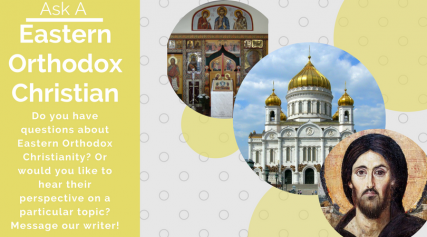What would you like to know about the Eastern Orthodox Christian faith? Submit your question.
Is there a version of the faith that appeals to a modern cynic? I highly admire the solidarity and family cultural protection of the faith. I also can see, similar to Buddhism, the idea of a co-operative attitude toward science. Is there a version that incorporates this with an Alexander Peresvet war practice and allows for more primal native faith practices as seen with the Peruvian San Pedro (sacred plant) shamans?

Let me first begin by pointing out some facts. The Center for the Study of Global Christianity at Gordon-Conwell Theological Seminary estimated there are 43,000 organized Christian denominations as of 2012, most of them formed in the last and present centuries.
Global Christianity
A majority of these Christian denominational faiths profess to be the one true church yet missing many crucial cornerstones of the original faith. The ancient church provided and defined a means to directly receive the healing energies of God by participating in the life of the Holy Spirit of God within that church. Some of these mysteries are the Eucharist, Baptism, Chrismation, Confession, Holy Unction which Christ and the Apostles established and gave their lives for.
Many Christian religions are born in the minds of men often resulting in a set of rules that one must follow to gain entry into the Kingdom. An example of this approach is found in Scholastic theology. This theology attempts to define and understand by intellectual and philosophical means the Revelation of God to man, falling short with its limited use and meaning of finite words of infinite Christian constructs.
One can state that a “religion” is the search for men to find God, however true Christianity is God pursuing man to reveal Himself to us. He brings this to our attention and tells us this in the Gospel of John.
John 14:6 says, “I am the the Way, the Truth and the Life.”
For Eastern Orthodox, Christianity is NOT a religion. It is a way of life about one’s personal relationship with Christ and all of mankind.
Authentic Christian spirituality comes from noetic perception in the heart, the center of consciousness. Saint Paul says that you are the temple of the Holy Spirit (1 Cor 6:19) and it is there that the Holy Spirit of God brings Christ to reside in this temple within you (Gal 2:20). It is here in this presence of Christ where we encounter Him and receive divine revelation, illumination, healing energies, and deification (sanctification).
Christ doesn’t live in our minds; He lives in our hearts. It is there that Christ imparts “a knowing,” a level of consciousness higher than reasoning and deeper than the emotions. This knowing is not a rational cognitive process of thinking. It is an instant knowing, experienced in man directly from God (Gen 3:22).
One must understand that in the Christian walk is at best described as a work in progress and not an instant state of perfection by declaration or adoption. It is not about scoring enough points by following a set of rules to slide into heaven. It is a journey of personal transformation of oneself into what we were designed to become, what God is by nature through His grace and mercy.
In Romans 12:2 Saint Paul says, “Be transformed with the renewal of your nous (heart).” The New Testament was written in ancient Koine Greek, and the word is nous, not as translated in bibles today as “mind.”
The teachings of Christ and the Apostles were never meant to be other than how and why we should love God and one another as much as we love ourselves, ultimately freeing ourselves from our prison of self-centeredness.
Love is not an action that we take off the shelf and use in any given situation or event. Love is what man has been designed to become. Christianity may be defined in a statement of belief in the mind, but to synergistically experience it is in the heart where the experience is higher than reasoning and deeper than emotions.
So if you want a faith that is not from man but of God, then I would direct you to further reading of: “What is Orthodoxy?”








